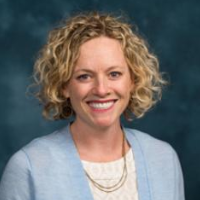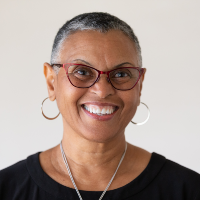Disasters, Older Adults, and Health Disparities
Part 1 (Keynote): A Health Policy Hurricane: Promoting Healthy Aging in a Changing Climate
Presenter: Sue Anne Bell, Assistant Professor, Department of Systems, Populations and Leadership, University of Michigan School of Nursing
Summary:
Recent hurricanes, wildfires, and the COVID-19 pandemic have pushed the U.S.’s disaster response system to its limit. This talk describes how disasters affect healthy aging beyond the immediate after-effects of a disaster and details the urgent scientific and policy needs for older adults to mitigate, prepare, respond and recover from these events, with the aim of building healthy and resilient communities.
Learning Objectives:
Part 2: Panel - Perspectives from Oregon
- Ruby Haughton-Pitts, State Director, AARP Oregon
- Lori Stanton, Regional Manager, Alzheimer’s Association Oregon Chapter
- Alexis Alberti, Division Director, Department of County Human Services, Multnomah County, Oregon
Summary:
Emergencies and disasters like the COVID-19 pandemic expose health disparities for older adults that exist between racial and ethnic groups due to economic and social conditions. During emergencies, these disparities can isolate older adults from the resources needed to prepare for emergencies and stay safe. Join presenters from AARP, Alzheimer’s Association and Multnomah County Human Services for a timely and important discussion.
Learning Objectives:
- Identify disparities that heighten the impact of emergencies and disasters on racial and ethnic minorities with a focus on older adults.
- Identify disparities that can isolate older adults from the resources needed to prepare for emergencies and stay safe.
- Discuss the role local government and community organizations can play in addressing health disparities for older adults in times of disaster and emergencies.
Session Facilitators: Sara Kofman & Walt Dawson
Continuing Education Credit:
This session has been approved for 2 CME credits (AMA PRE Category 1)* and 2 AFH training credits.
 *Accreditation Statement: This activity has been planned and implemented in accordance with the Essential Areas and Policies of the Accreditation Council for Continuing Medical Education (ACCME) through the joint providership of St. Charles Health System and Oregon Gerontological Association (OGA). St. Charles Health System is accredited by the ACCME to provide continuing medical education for physicians. St. Charles Health System designates this live activity for a maximum of 2 AMA PRA Category 1 Credit(s)™. Physicians should claim only the credit commensurate with the extent of their participation in the activity.
*Accreditation Statement: This activity has been planned and implemented in accordance with the Essential Areas and Policies of the Accreditation Council for Continuing Medical Education (ACCME) through the joint providership of St. Charles Health System and Oregon Gerontological Association (OGA). St. Charles Health System is accredited by the ACCME to provide continuing medical education for physicians. St. Charles Health System designates this live activity for a maximum of 2 AMA PRA Category 1 Credit(s)™. Physicians should claim only the credit commensurate with the extent of their participation in the activity.
This is the first of five sessions of OGA's 2020 virtual conference. You can register for individual sessions or, at a discount, for the entire conference series. For an overview of all sessions, please visit the conference page.
Register Here
 Sue Anne Bell, PhD, FNP-BC, NHDP-BC, is an Assistant Professor at the University of Michigan School of Nursing, with expertise in disaster preparedness and response, community health and emergency care. Trained as a health services researcher, her work focuses on the health and well-being of aging populations in the context of a disaster. She studies the long-term health impact of disasters with an emphasis on chronic health conditions and the relationship between community resilience, aging and disasters. Sue Anne is currently serving a three term on the Federal Emergency Management Agency’s National Advisory Council. She is clinically active in disaster response as a nurse practitioner with the U.S. Department of Health and Human Service’s National Disaster Medical System with recent deployments to Hurricane Maria and the Paradise California wildfire and to the COVID-19 response.
Sue Anne Bell, PhD, FNP-BC, NHDP-BC, is an Assistant Professor at the University of Michigan School of Nursing, with expertise in disaster preparedness and response, community health and emergency care. Trained as a health services researcher, her work focuses on the health and well-being of aging populations in the context of a disaster. She studies the long-term health impact of disasters with an emphasis on chronic health conditions and the relationship between community resilience, aging and disasters. Sue Anne is currently serving a three term on the Federal Emergency Management Agency’s National Advisory Council. She is clinically active in disaster response as a nurse practitioner with the U.S. Department of Health and Human Service’s National Disaster Medical System with recent deployments to Hurricane Maria and the Paradise California wildfire and to the COVID-19 response.
 Ruby Haughton-Pitts is the State Director for AARP Oregon, Oregon’s largest nonprofit, nonpartisan organization with more than 510,000 members in the state. With a staff of seven and more than 1500 volunteers, AARP Oregon contributes to positive social change for people 50+ and their families.
Ruby Haughton-Pitts is the State Director for AARP Oregon, Oregon’s largest nonprofit, nonpartisan organization with more than 510,000 members in the state. With a staff of seven and more than 1500 volunteers, AARP Oregon contributes to positive social change for people 50+ and their families.
Previously, Ruby worked as Director of Outreach and Advocacy in Chicago for AARP Illinois. She served as Director of Legislative and Public Affairs at CareOregon, Vice President of External Affairs for OCHIN (a nationwide nonprofit healthcare innovation center), and Vice President of Government Relations for U.S. Bancorp in Portland. She is a graduate of the University of Oregon.
 Lori Stanton is the Regional Manager for the Alzheimer’s Association, overseeing all the Regional offices within the Oregon chapter as well as the diversity and inclusion priorities. Lori earned a duel Master of Arts degree in Social Gerontology and Advocacy from Alaska Pacific University. She is an Eden Associate, and currently serves on the board for LABRYS Society.
Lori Stanton is the Regional Manager for the Alzheimer’s Association, overseeing all the Regional offices within the Oregon chapter as well as the diversity and inclusion priorities. Lori earned a duel Master of Arts degree in Social Gerontology and Advocacy from Alaska Pacific University. She is an Eden Associate, and currently serves on the board for LABRYS Society.
Lori has worked in the field for the past 25 years, and assisted The Salvation Army Serendipity Adult Day Services in becoming the first Adult Day Center in the Nation to receive the Excellence in Care, Dementia Program of Distinction award from the Alzheimer’s Foundation of America. She has worked for the Alzheimer’s Association for the past seven years and currently resides with her lovely family in the beautiful and scenic Grants Pass.
 Alexis Alberti is the Division Director of Intellectual and Developmental Disabilities at Multnomah County Department of County Human Services (DCHS). As a Portland native growing up in NE Portland, Alexis attended Portland Public Schools and Portland State University, obtaining a degree in Psychology. Alexis began with Multnomah County as a case manager and has held positions in both the young adults program and adults program within Intellectual and Developmental Disabilities. In 2018 she went to Aging, Disability and Veterans Services Division to serve as one of the local Area on Aging branch managers. In March of 2020 Alexis returned to Intellectual and Developmental Disabilities as the Division Director.
Alexis Alberti is the Division Director of Intellectual and Developmental Disabilities at Multnomah County Department of County Human Services (DCHS). As a Portland native growing up in NE Portland, Alexis attended Portland Public Schools and Portland State University, obtaining a degree in Psychology. Alexis began with Multnomah County as a case manager and has held positions in both the young adults program and adults program within Intellectual and Developmental Disabilities. In 2018 she went to Aging, Disability and Veterans Services Division to serve as one of the local Area on Aging branch managers. In March of 2020 Alexis returned to Intellectual and Developmental Disabilities as the Division Director.
In the past decade with DCHS Alexis has participated in a variety of internal and external committees related to equity and social justice, including: the DCHS Department Equity & Social Justice Committee, the Office of Developmental Disabilities Service Equity Workgroup, IDDSD Strategic Planning Equity Committee. Alexis’ goal of participating in various diversity and equity committees/work groups is to expand culturally appropriate services and to create truly inclusive services for groups and individuals from diverse backgrounds.
Supporting Sponsors for this session:






The entire conference series is sponsored by:







 Prev Month
Prev Month View Month
View Month Search
Search Go to Month
Go to Month Next Month
Next Month *Accreditation Statement: This activity has been planned and implemented in accordance with the Essential Areas and Policies of the Accreditation Council for Continuing Medical Education (ACCME) through the joint providership of St. Charles Health System and Oregon Gerontological Association (OGA). St. Charles Health System is accredited by the ACCME to provide continuing medical education for physicians. St. Charles Health System designates this live activity for a maximum of 2 AMA PRA Category 1 Credit(s)™. Physicians should claim only the credit commensurate with the extent of their participation in the activity.
*Accreditation Statement: This activity has been planned and implemented in accordance with the Essential Areas and Policies of the Accreditation Council for Continuing Medical Education (ACCME) through the joint providership of St. Charles Health System and Oregon Gerontological Association (OGA). St. Charles Health System is accredited by the ACCME to provide continuing medical education for physicians. St. Charles Health System designates this live activity for a maximum of 2 AMA PRA Category 1 Credit(s)™. Physicians should claim only the credit commensurate with the extent of their participation in the activity. Sue Anne Bell, PhD, FNP-BC, NHDP-BC, is an Assistant Professor at the University of Michigan School of Nursing, with expertise in disaster preparedness and response, community health and emergency care. Trained as a health services researcher, her work focuses on the health and well-being of aging populations in the context of a disaster. She studies the long-term health impact of disasters with an emphasis on chronic health conditions and the relationship between community resilience, aging and disasters. Sue Anne is currently serving a three term on the Federal Emergency Management Agency’s National Advisory Council. She is clinically active in disaster response as a nurse practitioner with the U.S. Department of Health and Human Service’s National Disaster Medical System with recent deployments to Hurricane Maria and the Paradise California wildfire and to the COVID-19 response.
Sue Anne Bell, PhD, FNP-BC, NHDP-BC, is an Assistant Professor at the University of Michigan School of Nursing, with expertise in disaster preparedness and response, community health and emergency care. Trained as a health services researcher, her work focuses on the health and well-being of aging populations in the context of a disaster. She studies the long-term health impact of disasters with an emphasis on chronic health conditions and the relationship between community resilience, aging and disasters. Sue Anne is currently serving a three term on the Federal Emergency Management Agency’s National Advisory Council. She is clinically active in disaster response as a nurse practitioner with the U.S. Department of Health and Human Service’s National Disaster Medical System with recent deployments to Hurricane Maria and the Paradise California wildfire and to the COVID-19 response.  Ruby Haughton-Pitts is the State Director for AARP Oregon, Oregon’s largest nonprofit, nonpartisan organization with more than 510,000 members in the state. With a staff of seven and more than 1500 volunteers, AARP Oregon contributes to positive social change for people 50+ and their families.
Ruby Haughton-Pitts is the State Director for AARP Oregon, Oregon’s largest nonprofit, nonpartisan organization with more than 510,000 members in the state. With a staff of seven and more than 1500 volunteers, AARP Oregon contributes to positive social change for people 50+ and their families. Lori Stanton is the Regional Manager for the Alzheimer’s Association, overseeing all the Regional offices within the Oregon chapter as well as the diversity and inclusion priorities. Lori earned a duel Master of Arts degree in Social Gerontology and Advocacy from Alaska Pacific University. She is an Eden Associate, and currently serves on the board for LABRYS Society.
Lori Stanton is the Regional Manager for the Alzheimer’s Association, overseeing all the Regional offices within the Oregon chapter as well as the diversity and inclusion priorities. Lori earned a duel Master of Arts degree in Social Gerontology and Advocacy from Alaska Pacific University. She is an Eden Associate, and currently serves on the board for LABRYS Society. Alexis Alberti is the Division Director of Intellectual and Developmental Disabilities at Multnomah County Department of County Human Services (DCHS). As a Portland native growing up in NE Portland, Alexis attended Portland Public Schools and Portland State University, obtaining a degree in Psychology. Alexis began with Multnomah County as a case manager and has held positions in both the young adults program and adults program within Intellectual and Developmental Disabilities. In 2018 she went to Aging, Disability and Veterans Services Division to serve as one of the local Area on Aging branch managers. In March of 2020 Alexis returned to Intellectual and Developmental Disabilities as the Division Director.
Alexis Alberti is the Division Director of Intellectual and Developmental Disabilities at Multnomah County Department of County Human Services (DCHS). As a Portland native growing up in NE Portland, Alexis attended Portland Public Schools and Portland State University, obtaining a degree in Psychology. Alexis began with Multnomah County as a case manager and has held positions in both the young adults program and adults program within Intellectual and Developmental Disabilities. In 2018 she went to Aging, Disability and Veterans Services Division to serve as one of the local Area on Aging branch managers. In March of 2020 Alexis returned to Intellectual and Developmental Disabilities as the Division Director.







 Export Event
Export Event